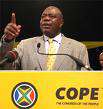COPE is the second post-1994 breakaway political movement to come out of the ANC. The first was the UDM jointly led by the former Transkei military leader, Bantu Holomisa, and the former national party negotiator, Roelf Meyer. The UDM came onto the political scene in 1999 winning 3.4% of parliamentary seats. It was regarded in some quarters as an early precursor of what a multiracial political opposition party in South Africa could look like. It however failed to build on any of its 1999 momentum and while still represented in Parliament, it is today politically insignificant.
The emergence of COPE ahead of last year’s elections generated similar expectations. Many analysts had long forecast some kind of significant split in the ruling alliance. There was some expectation that COPE was that split. There was also the expectation that COPE offered a new political alternative to voters who found themselves confronted by lack of variety on South Africa’s political spectrum. There was also the view that COPE offered the country the chance to break out of the racial voting nexus that characterized the support bases of both the ANC and the DA.
The most significant feature of the COPE’s emergence was whether it pointed to a fracturing of the ruling tri-partite alliance. This is something that must have concerned many senior ANC officials in the aftermath of their overthrow of Thabo Mbeki. A successful splinter movement might have been the impetus necessary to generate further splinters. Certainly the term ‘alliance’ can only be used very loosely in describing the current state of relations within and between the ANC, the SACP, and COSATU. There is much potential for various factions in this alliance to fracture the alliance even further.
No group could then have been more relieved by the current state of COPE than the ANC itself. Not only has COPE not materialised as a threat to the political hegemony of that party, but it may even have strengthened the ANC. It will have done this through warning potential splinters that political life outside the patronage and protection of the ruling party is very cold. Many potential splinters and even more significant splits will have taken note of COPE’s declining fortunes and may be deterred from following COPE’s example.
This column previously suggested that COPE could emerge as a greater threat to the DA than to the ANC. This was a view that the DA leader, Helen Zille, refuted with characteristic disdain. A further result of COPE’s political infighting will now probably also be too significantly strengthen the political standing of the DA as the only serious alternative to the ANC. This suggests that South African politics will, for the time being, return to a contest between the ANC and the DA. This will be even more so if the DA begins to merge or formally align with the larger of the smaller opposition parties such as the ID.
On 22January 2009 the Institute used this column to forecast the results of the then forthcoming national elections. Writing about COPE we forecast that they could win 8% of parliamentary seats. As things turned out they won 7.5%. We did qualify that forecast though by saying that, “This is despite the fact that it has attracted such a mix of malcontents into its leadership that future infighting may prove it to be nothing more than a one-hit-wonder party”. Current infighting suggests that the ‘one hit wonder’ forecast will be proved accurate come next year’s local government elections.
- Frans Cronje

